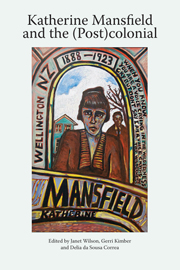Book contents
- Frontmatter
- Contents
- List of Illustrations
- Acknowledgements
- Colophon
- Introduction
- Criticism
- Katherine Mansfield: Cannibal
- Mansfield as (Post) colonial-Modernist: Rewriting the Contract with Death
- Colonialism and the Need for Impurity: Katherine Mansfield, ‘The Garden Party’ and Postcolonial Feeling
- ‘How Katherine Mansfield was Kidnapped’: A (Post) colonial Family Romance
- ‘Unmasking’ the First-Person Narrator of In a German Pension
- Workmanship and Wildness: Katherine Mansfield on Edith Wharton's The Age of Innocence
- Home and Abroad in the South Pacific: Spaces and Places in Robert Louis Stevenson and Katherine Mansfield's Short Fiction
- Literatures of Expatriation and the Colonial Mansfield
- Creative Writing
- Reports
- Reviews
- Notes on Contributors
- Katherine Mansfield Society
Katherine Mansfield: Cannibal
from Criticism
Published online by Cambridge University Press: 05 March 2014
- Frontmatter
- Contents
- List of Illustrations
- Acknowledgements
- Colophon
- Introduction
- Criticism
- Katherine Mansfield: Cannibal
- Mansfield as (Post) colonial-Modernist: Rewriting the Contract with Death
- Colonialism and the Need for Impurity: Katherine Mansfield, ‘The Garden Party’ and Postcolonial Feeling
- ‘How Katherine Mansfield was Kidnapped’: A (Post) colonial Family Romance
- ‘Unmasking’ the First-Person Narrator of In a German Pension
- Workmanship and Wildness: Katherine Mansfield on Edith Wharton's The Age of Innocence
- Home and Abroad in the South Pacific: Spaces and Places in Robert Louis Stevenson and Katherine Mansfield's Short Fiction
- Literatures of Expatriation and the Colonial Mansfield
- Creative Writing
- Reports
- Reviews
- Notes on Contributors
- Katherine Mansfield Society
Summary
Engaging with concepts of barbarism throughout her career, Katherine Mansfield displayed a fascination with cannibalism that held both political and aesthetic significance for her ‘de-centered, female, colonial, proto-postcolonial’ voice. Moving through a typology of cannibalisms, Mansfield used anthropophagic tropes to explore settler ambivalence and unsettle categorisations of coloniser and colonised, shifting from a negative cannibalism of revenge towards a tender anthropophagy which allowed her return to New Zealand through fiction. The self-description Mansfield sent to the editor of the Native Companion – that she was ‘just eighteen years of age – with a rapacious appetite for everything and principles as light as [her] purse’ – casts a mould for Mansfield the adult, an insatiable literary cannibal to whom taboos meant nothing. The draw of cannibalism was felt by modernists more widely, as demonstrated by Conrad's Heart of Darkness (1902), Francis Picabia's Manifeste Cannibale (1920) and the Parisian Dada review Cannibale (1920s), as well as Oswalde de Andrade's Manifesto Antropófago (1928), Waugh's Black Mischief (1932) and Eliot's Sweeney Agonistes (1932). Where Sweeney sought to achieve spiritual purity by quitting London for a cannibal island, the young Mansield would thrill at exporting her own brand of savagery to Europe. She revelled at being dubbed the ‘little savage from New Zealand’ by her principal at Queen's College, London, and as an adult would develop a commitment to brutalism by consistently refusing to represent a falsely civilised world view in her fiction.
- Type
- Chapter
- Information
- Katherine Mansfield and the (Post)colonial , pp. 15 - 28Publisher: Edinburgh University PressPrint publication year: 2013



